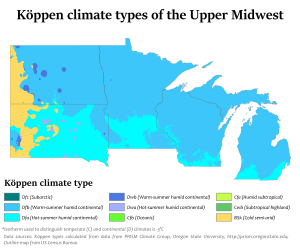Upper Midwest
The Upper Midwest, or the North, is a region in the northern portion of the U.S. Census Bureau's Midwestern United States. It is largely a sub-region of the midwest. Although there are no uniformly agreed-upon boundaries, the region is most commonly used to refer to the states of Minnesota, Wisconsin, and Michigan. By most definitions, it extends into North and South Dakota, and northern Ohio, Indiana, Illinois, and Iowa.
Definitions
The National Weather Service defines its Upper Midwest as the states of Iowa, Michigan, Minnesota, North Dakota, South Dakota, and Wisconsin. The United States Geological Survey uses two different Upper Midwest regions:
- The USGS Upper Midwest Environmental Sciences Center considers it to be the six states of Illinois, Indiana, Iowa, Michigan, Minnesota, and Wisconsin, which comprise the watersheds of the Upper Mississippi River and upper Great Lakes.
- The USGS Mineral Resources Program considers the area to contain Illinois, Indiana, Michigan, Minnesota, and Wisconsin.
The Association for Institutional Research in the Upper Midwest includes the states of Iowa, Minnesota, North Dakota, South Dakota, Wisconsin, and the upper peninsula of Michigan in the region.
Climate

The region has dramatic variations between summer and winter temperatures; summers are very hot and winters very cold. For example, Sioux Falls averages 25 days each year with temperatures above 90 °F (32 °C) and 45 days each year with temperatures below 5 °F (−15 °C).[1] Mitchell, South Dakota has a record high of 116 °F (47 °C) and a record low of −39 °F (−39 °C).[2]
The growing season is shorter, cooler, and drier than areas farther south and east. The region's western boundary is sometimes considered to be determined by where the climate becomes too dry to support growing non-irrigated crops other than small grains or hay grass.
Language
The Inland North dialect, most prominently characterized by the Northern Cities Vowel Shift, is centered in the eastern part of the Upper Midwest, including Wisconsin, Michigan, and the northern parts of Illinois and Ohio; it extends beyond the Midwest into Upstate New York. North Central American English (also known as "Upper Midwestern"[3]), a residual accent of American English, is spoken in Minnesota, parts of Wisconsin and Iowa, the Upper Peninsula of Michigan, portions of Montana, and the Dakotas.[4]
Politics
The Upper Midwest was the heartland of early 20th-century Progressive Party politics, and the region continues to be favorable to the Democratic Party of the United States and moderate Republicans, with Minnesota favoring each Democratic presidential candidate since 1976 and Wisconsin from 1988 to 2012. Minnesota narrowly supported native Walter Mondale in 1984 in an election where Ronald Reagan won every other state. Michigan, Illinois, and Wisconsin also often favor Democratic candidates. By contrast, the lower Midwest includes swing states such as Ohio, Iowa and solidly Republican (until 2008) Indiana. Missouri has voted reliably for the Republican presidential candidates in recent elections. The Plains States/The Dakotas to the west are heavily Republican and have voted Republican in every presidential contest since 1964.
Industry and tourism
The economy of the region was largely based upon the mining of iron and copper, as well as a very large timber industry. Mechanization has sharply reduced employment in those areas, and the economy is increasingly based on tourism. Popular interest in the environment and environmentalism, added to traditional interests in hunting and fishing, has attracted a large urban audience who live within driving range.[5]
See also
- Culture of Minnesota
- Louisiana (New France)
- Northern Tier (United States)
- 100th meridian west
- Siouxland
External links
- The History of the Upper Midwest: An Overview
- USGS Upper Midwest Environmental Sciences Center
- U.S. Geological Survey's (USGS) Upper Midwest Mineral Resources Program
References
- ↑ Weatherbase
- ↑ Mitchell, SD temperature extremes
- ↑ Allen, Harold B. (1973). The Linguistic Atlas of the Upper Midwest. Minneapolis: University of Minnesota Press. ISBN 0-8166-0686-2.
- ↑ Labov, William; Sharon Ash; Charles Boberg (2006). The Atlas of North American English. Berlin: Mouton de Gruyter. ISBN 3-11-016746-8.
- ↑ Aaron Shapiro, The Lure of the North Woods: Cultivating Tourism in the Upper Midwest (University of Minnesota Press, 2015).